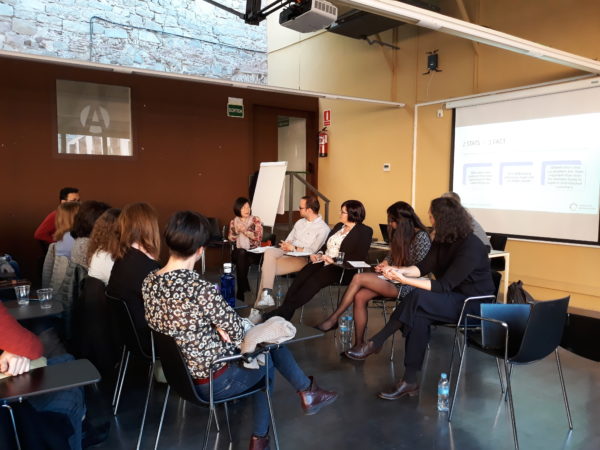
Localization at startups
A Women in Localization event
Last 4th April I was honoured to be part of a panel about localization at startups. Women in Localization Catalan chapter was the organiser of the event. Women in Localization is an international association promoting the professional development of women in the localization industry and equal opportunities for men and women in this industry.
The event was sponsored by Bureau Works, who also invited us to a fantastic pinchos and wine session after the event.
The moderator of the panel was Eva Oliva, Account Director at Lionbridge, and the panel was made up of Viktória Farsang, Localization Project Manager at Glovo, Jérémie Mairesse, Product VP at Job and Talent, Yuka Ghesquière Nakasone, Globalization and Localization Director at Beabloo, and me, of course.
See below some of the topics we discussed in this panel.
What is a startup? When and how does a startup decide to localize their products?
To put this panel in context, Eva defined a startup as a company with a high technological profile and aimed at growing very fast. Sometimes it is also a small enterprise, but this is just a coincidence, not a requirement for a startup.
If it wants to grow fast, a startup must be global since its foundation. Products have to be developed with localization in mind, i.e., they have to be internationalized. This way we can avoid errors during the localization phase that slow the release of the product in other countries.
According to my experience, many startups have a reactive approach to localization, instead of a proactive one. They translate their products because they have a potential partner or investor in another country, because they have detected a demand for their product in that country or because they are attending a congress and they want to have a sample of their product in another language. Quite often they localize their software in-house (asking foreign employees or employees that can speak that language) or asking their partners or resellers in their target countries (who are not translators either), and they outsource the translation of their marketing collateral to professional translators.
Some companies decide to launch their product in several countries at the same time, while others do it one country at a time. Job and Talent is an example of the latter. As they open a branch on each country and the localization of their products depends a great deal on the legal requirements regarding employment in every industry, they do not translate into another country until they can see they have job offers for that country. Once they set up a branch in another country, they outsource the translation of their tool to professional translators, but they translate in-house any updates and marketing campaigns. Employees who are native speakers of the target language, but who are not necessarily translators are the ones in charge of these translations.
Although we are very aware of the importance of localization, the truth is that it is still quite unknown to many companies. As Yuka explained, localization is a cross-curricular area that affects almost any department in a global company. This is why it cannot be limited to Product Development or Marketing; localization needs to have its own department, right below Operations, so that it can be aware of what is happening at any department that may require localization, from Product Development to the Legal department, to comply with country-specific legal requirements. For example, the recent GDPR. This is how they have established it at Beabloo.

Aaron Schliem, Viktória Farsang and me in the panel presentation
Is budget significant when approaching localization at startups?
Any company, big or small, needs to have enough budget to invest in localization. We see it as an investment, but I know it is difficult to convince the CFO of the benefits of localization if we do not show them their ROI. However, as Yuka and Jérémie explained, it is difficult to create a business case for a startup, mainly because the decision-making process in these companies is too fast. What we know for sure is that despite English is the language used in the technological industry, it is easier to engage users if you offer them content in their language. Translation builds trust.
How is translation quality assured at startups?
Companies usually work with in-country reviewers to test the product as potential users and see if the translation matches their language and culture. However, as Viktória explained, these reviewers do not always have the same knowledge of the product a the translator who has been working for months in this product. Therefore, this evaluation may not always be as effective as we expect.
Communication is essential to ensure the quality of a localized product. As we could notice in this panel, this statement, which seems so obvious, is not so clear to companies requesting translation services, no matter if they are startups or consolidated companies.

Yuka Ghesquière Nakasone talks about her experience at former startup Beabloo
How important is automation at startups?
Nowadays, any company, regardless of their size, automate part of their tasks. It is natural, and it is needed to reduce costs and speed processes. There are more and more platforms that allow translators and clients to be in contact without having a translation agency as the middle man. However, this is not always useful in any companies. In my case, when a company does not have an in-house Localization Manager, I act as the Project Manager and localization consultant for this client, besides being the main translator for Spanish.
Similarly, machine translation is not useful neither for a company that has a 500-word app to translate and that launches a small update now and then. Not all startups have the same needs and nor all products are equal. Therefore, automation and cost reduction strategies need individual assessment.
Localization platforms allow us to speed processes and stop working with Excel and Word files, that are quite useless in localization. Some localization issues have been minimised thanks to software that assess the internationalization level of the code, but cultural problems related to localization are still of importance.
For example, I translate photo album titles for one of my clients. Last November we had a Thanksgiving photo album to translate, but as you know, we do not celebrate this tradition in Spain. I had to advise my client not to use this title and think of another photo album we could use that month. This level of cultural details is something that machine translation has not managed to achieve yet.
As you can see, we talked about many topics, and we had many more left to discuss, but we ran out of time too soon. This may be a perfect excuse for a second part, and I will be glad to be part of the panel again.
I want to thank Women in Localization and her president Patricia Paladini, for inviting me to talk about my experience as a translator and localizer and as an entrepreneur at Prêt-à-translate. I also want to thank Ilaria Cusumano for the pictures that I included in this post, and Javier Díaz Fernánez-Carvajal, for organising the lunch before the event and the pinchos and wine session afterwards.
Are you a startup? Are you considering going global? Let’s go global together! Drop me an email and let me know what do you need.
